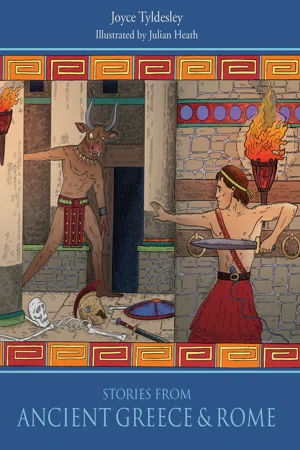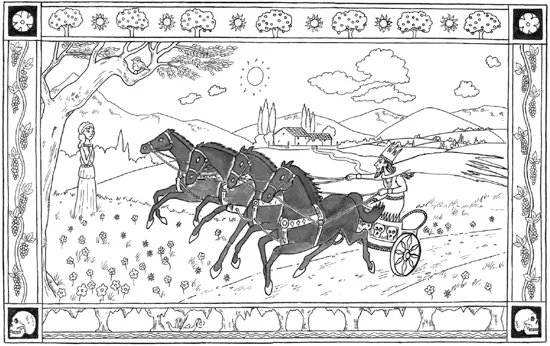![]()
1
PERSEPHONE VISITS THE UNDERWORLD
The goddess Demeter worked very hard every day. It was her job to make sure that the people of Greece always had enough food to eat. She made the crops grow in the fields, the fruit ripen on the trees and the flowers bloom in the gardens. She taught the farmers how to plough the fields, and how to scatter seeds on the land. When the grain and the vegetables and the fruit had grown, she taught the farmers how to collect the plentiful harvest, and how to store it safely in their barns. Thanks to Demeter’s hard work, the people of Greece never went hungry.
Demeter had just one child: a beautiful daughter, named Persephone. Persephone was as good and kind and cheerful as she was beautiful. She was a happy girl, who loved to sing and play in the warm sunlight while her mother was busy helping the people to grow their food. Everyone loved Persephone, but Demeter loved her most of all.
One sunny day, Persephone was singing and picking pretty flowers in the green meadow when Hades drove by in a golden chariot pulled by four fierce black horses. Instantly, Hades fell head over heels in love with the beautiful Persephone. He wanted her to be his wife, and to live with him forever. But Hades was no ordinary man. He was the god-king of the Underworld; the dark and cold land where the dead live as ghosts. The sun never shone in the Underworld. There were no green meadows, and no pretty flowers to pick. Hades knew that Demeter would never allow him to marry Persephone and take her to live in the gloomy Underworld, away from the warmth and sunlight that she loved. And so he decided not to tell Demeter what he was going to do. He simply reached down and dragged Persephone, kicking and screaming, into his chariot. Ignoring the girl’s terrified screams, Hades drove as fast as he could away from the green meadow.
Persephone was very frightened. She cried and shouted for her mother, but Hades would not listen and would not stop. The four fierce black horses galloped as hard as they could, pulling the golden chariot for many miles, until they reached a broad and fast-flowing river. This river was home to a water spirit, or Naiad. The Naiad knew Demeter, and wanted to help Persephone. She made the river-water waters rise up and block the road. Finally, the golden chariot was forced to stop. This made Hades very angry. He struck the river with his stick and, instantly, the waters parted. A deep, dark crack opened in front of his golden chariot. Hades cracked his whip, and the four fierce black horses pulled the golden chariot through the deep, dark crack, into the Underworld. Persephone just had time to untie her belt and throw it to the ground before the earth closed around her.
Hades and Persephone were married that day. Persephone was now the queen of the gloomy Underworld. She sat on a golden throne beside her new husband, and cried for the sunshine and flowers that she loved. Hades, who loved Persephone very much, tried to tempt her to eat with delicious cakes and fruits, but she would not stop crying and she would not eat anything. She did not hate Hades, because he was very kind to her. But Persephone did not want to live in the gloomy Underworld with the ghosts. She wanted to live in the warmth and sunlight, with her mother.
Returning home from work, Demeter found Persephone gone. Frantic, she started to search for her beloved daughter. The search went on for many days and, as she wandered the land, Demeter forgot her duties. The crops started to fail in the fields, the flowers began to rot in the gardens, and the fruit died on the trees. There was no food for the farmers to harvest. Soon all of Greece was hungry, but Demeter ignored the cries of the people as she continued to search for her lost daughter.
Eventually Demeter found Persephone’s belt lying beside the river, and recognised it. Here, at last, was a clue. Demeter summoned the Naiad who lived in the river, and asked if she had seen Persephone drop her belt. The Naiad was able to tell Demeter what had happened; how Persephone had been snatched by Hades and taken unwillingly into the Underworld to be his queen. Horrified by this story, Demeter appealed to Zeus, king of the gods, for help. She wanted her beloved daughter to be returned safe to her. She did not want her to live forever in the gloomy Underworld.
Zeus could see that Demeter would not stop grieving until she knew that Persephone was safe. It worried him that Demeter had abandoned her work, and that the people now had no food to eat. This situation could not continue. So he told Demeter to cheer up. Persephone was safe and fairly happy in the Underworld with Hades as her husband. Demeter, however, was not satisfied with this, and she begged Zeus to allow Persephone to return home to her mother. Zeus thought about the problem, then gave his judgement. Persephone could indeed return to her mother. However, there was one important condition. Persephone could only return home if she had not eaten anything in the Underworld. Filled with joy, Demeter sent a messenger to the Underworld to tell Persephone the good news.
When she heard her mother’s message, Persephone burst into tears. Only that morning, feeling faint with hunger, she had eaten six seeds from a pomegranate fruit. Was she now doomed to live forever in the gloom of the Underworld, because of six very small pomegranate seeds?
Demeter again turned to Zeus for help. Was her daughter really trapped in the Underworld because she had eaten just six very small pomegranate seeds? Again, Zeus thought about the problem, and gave his judgement. As she had eaten six seeds, Persephone was to spend six months of each year with her husband Hades, in the gloomy Underworld. The other six months of the year could be spent with her mother, Demeter, in the sunlit land of the living.
And this is exactly what happened. For half the year Persephone lived in the gloomy Underworld with her husband Hades. During these months Demeter abandoned her work and mourned her lost daughter. Without Demeter to care for them the crops in the fields slowly died, the flowers in the gardens withered, and the leaves and fruit fell off the trees. For the other half of the year Persephone left her husband in the Underworld and went to live with her mother. During these months Demeter, who was now filled with happiness, went back to work. She caused the crops to grow again in the fields, the fruit to ripen on the trees and the flowers to bloom once more in the gardens. Every year there was a plentiful harvest. Greece was once again a land rich in food, and the people were no longer hungry.
ABOUT PERSEPHONE’S STORY
The ancient Greek farmers had noticed that the year could be divided into four seasons: spring, when the leaves started to appear on the trees; summer, when the sun shone bright and hot; autumn, when the fruit was ripe on the trees; and winter, when the days were short and cold and nothing grew in the fields.
The story of Demeter and Persephone explained why this happened. Spring was the time when Demeter was looking forward to her daughter’s return from the Underworld. Summer was the time when Demeter was happy because Persephone was with her. Autumn was the time when Demeter started to feel sad because Persephone would soon be returning to her husband Hades. And winter was the time when Persephone lived with her husband in the Underworld.
WHAT DO YOU THINK?
1. Why did the people love Demeter?
2. What does a pomegranate look like?
3. Do you know how many months there are in each year? And how many days there are in each month?
4. What foods do you think the ancient Greeks ate?
![]()
2
PANDORA OPENS A BOX
Many, many years ago, there lived two brothers named Prometheus and Epimetheus. The brothers lived at a time when only the gods and goddesses knew how to make fire. Prometheus, who was a brave and clever man, felt that this was very unfair. The gods and goddesses should share the secret of fire with the people. Prometheus travelled to Mount Olympus, the home of the gods and goddesses, and stole the secret of fire. He gave fire to the people. The people were now very happy; they could use the fire keep warm in winter, and could light lamps that would allow them to see when night fell. They could cook their food, and could melt metal to make useful tools. The gods and goddesses, however, were very unhappy. Zeus, king of the gods, was especially angry with the two brothers, and plotted his revenge.
Zeus asked the gods and goddesses to help him create a beautiful woman. The woman was modelled from clay and water, and given the gifts of beauty and grace. The gods and goddesses dressed her in lovely clothes and expensive jewellery, and taught her how to sew and weave cloth. The beautiful woman was named Pandora. Pandora was almost perfect. She had just one fault: she was a very nosy person. She wanted to know absolutely everything about the all the people and all the things around her.
Zeus introduced Pandora to the two brothers. Knowing that he had annoyed Zeus, and worried that Pandora might be a trap, Prometheus refused to have anything to do with her. Epimetheus, however, took one look at the beautiful woman and fell in love. He decided that he wanted to marry Pandora. Although Prometheus warned him to be very careful, Epimetheus could not believe that a woman as beautiful as Pandora could be dangerous.
Epimetheus married the beautiful Pandora and they lived together in a pretty house surrounded by gardens and olive groves. Their world was a very happy place. Sadness, anger and worry did not exist, and there was no illness and no death. The people were cheerful and content; every day they sang and laughed and danced in the bright sunlight. Epimetheus and Pandora were the happiest of all the people, because they were very much in love.
Zeus gave Pandora and Epimetheus a beautifully carved wooden box as a wedding present. As he handed the box over, he gave them strict instructions that they should never, ever, under any circumstances open the lid and look inside. Epimetheus put the box in the corner of their bedroom, and forgot all about it. He was not a curious man. Pandora, however, was always curious, and she was fascinated by the beautifully carved box. Every day she wasted many hours thinking about it and looking at it. She really, really wanted to know what was inside the box in her b...

